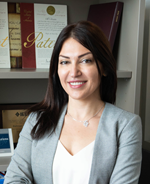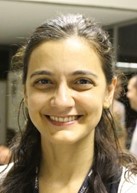Monday, 20 September 18:00 – 19:00
This panel discussion will bring together scientists from industry and academia to share their career stories and experiences, including the main challenges they had to face. The panel will also address topics such as the importance of technical and soft skills, the relevance of an effective career development plan, the role of networking, and valuable advice from the panelists for engineers and scientists in the field of signal/image processing and machine learning, including their view on the most important aspects to the hiring process.
The panel will be held in an informal atmosphere and it will be open for audience questions and discussions, so please don’t hesitate to have some questions in mind.
Additional panelists to be announced.
Dr. Henrique Malvar is a Fellow of the IEEE and a Member of the US National Academy of Engineering. He is a Distinguished Engineer at Microsoft Research, having previously served as Managing Director of the largest Microsoft Research Lab in Redmond, WA. Prior to joining Microsoft in 1997, he was Vice President of Research and Advanced Technology at PictureTel Corporation (later acquired by Polycom, which merged with Plantronics to become Poly). He holds a PhD in electrical engineering and computer science from the Massachusetts Institute of Technology. He has received the Claude Shannon-Harry Nyquist Technical Achievement Award from the IEEE Signal Processing Society, the Amar G. Bose Industrial Leader Award also from the SPS, and the Wavelet Pioneer Award from the SPIE.

Dr. Behnaz Ghoraani is an Associate Professor and the founder and director of the Biomedical Signal and Image Analysis lab at the Department of Computer & Electrical Engineering at Florida Atlantic University (FAU). Before joining FAU, she was an Assistant Professor at the Department of Biomedical Engineering (2012-2016). Dr. Ghoraani serves as a reviewer for several journals and international conferences, as well as national and international grant agencies. She is the Associate Editor of BioMedical Engineering OnLine Journal. Dr. Ghoraani has also been active in professional societies. She is serving as the Editor of the IEEE Signal Processing Newsletter and a member of the IEEE Signal Processing Society Strategic Planning Membership Committee. She has served as the Chair of the Young Professionals Committee of the IEEE Signal Processing Society, coordinator of the IEEE Canada Women in Engineering (WIE), chair of the IEEE Toronto WIE, and vice-chair of the IEEE Toronto Signal Processing Section, in addition to serving as a program committee member and technical program coordinator for several IEEE conferences.
Dr. Ghoraani's research has primarily focused on generating clinically relevant engineering solutions to tackle significant bottlenecks in data analytics with an emphasis on computer-aided clinical decision making, long-term and continuous health monitoring, remote and personalized therapeutic management, non-stationary and multidimensional signal analysis, adaptive signal feature extraction, and traditional and deep learning machine learning. Her research received the best paper awards of the IEEE Engineering in Medicine and Biology Society and the Gordon K. Moe Young Investigator Award. Dr. Ghoraani has over 70 peer-reviewed journal and conference papers, one book, two book chapters, and two patents. Her research has been funded by research grants from the National Institute of Health, National Science Foundation including National Science Foundation CAREER award in 2020, and Florida Department of Health.

Dr. Mylene C.Q. Farias received her B.Sc. degree in electrical engineering from Federal University of Pernambuco (UFPE), Brazil, in 1995 and her M.Sc. degree in electrical engineering from the State University of Campinas (UNICAMP), Brazil, in 1998. She received her Ph.D. in electrical and computer engineering from the University of California Santa Barbara (UCSB), USA, in 2004 for work in no-reference video quality metrics. Dr. Farias has worked as a research engineer at CPqD (Brazil) in video quality assessment and validation of video quality metrics. She has also worked as an intern for Philips Research Laboratories (The Netherlands) in video quality assessment of sharpness algorithms and for Intel Corporation (Phoenix, USA) developing no-reference video quality metrics. Currently, she is an Associate professor in the Department of Electrical Engineering at the University of Brasilia (UnB), where she is a member of the Graduate Program in Informatics and of the Graduate Program in Electrical Engineering. Dr. Farias is a researcher of the GPDS and her current interests include video quality metrics, video processing, multimedia signal processing, watermarking, and visual attention. Dr. Farias is a member of IEEE, the IEEE Signal Processing Society, ACM, and SPIE. Besides being a reviewer for several journals and conferences, she is currently an Associate Editor for the IEEE Signal Processing Letters, The (Elsevier) Signal Processing: Image Communication Journal, and the Journal of Electronic Imaging.

Dr. Leonardo Tomazeli Duarte received the B.S. and M.Sc. degrees in electrical engineering from the University of Campinas (UNICAMP), Brazil, in 2004 and 2006, respectively, and the Ph.D. degree from the Grenoble Institute of Technology (Grenoble INP), France, in 2009. Since 2011, he has been with the School of Applied Sciences (FCA) at UNICAMP, Limeira, Brazil, where he is currently an assistant professor. In 2016, he was a Visiting Professor at the École de Génie Industriel (GI-Grenoble INP, France). Since 2015, he has been recipient of the National Council for Scientific and Technological Development (CNPq, Brazil) productivity research grant. In 2017, he was the recipient of UNICAMP "Zeferino Vaz" Academic Recognition Award (for research and teaching performance at UNICAMP). He is currently the chair of the Young Professionals Subcommittee (IEEE-SPS) and is a member of The Signal Processing Theory and Methods (SPTM) Technical Committee (TC) of IEEE-SPS. His research interests primarily in the fields of signal processing, decision aiding and machine learning, and also in the interplays between these fields.
